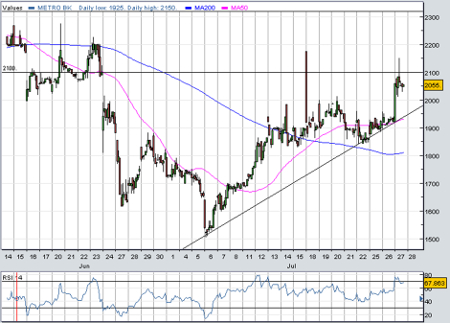Challenger bank recovery gathers pace
27th July 2016 14:53
by Lee Wild from interactive investor
Share on
No one wanted to own the banks after 23 June. Some still don't. There were challenger banks - the young upstarts - which lost as much as half their value in the blink of an eye. Brexit will trigger a recession, a housing crash, repossessions, investors screamed as they fled the sector in droves. But just a month later and the quality is slowly floating to the top.
On Tuesday, described a better-than-expected first half with no evidence that customers had changed behaviour after the shock EU referendum result. Profits are tipped to keep growing and the shares surged by 9%, taking their rally from the post-Brexit low to 35%.
Now, CEO Craig Donaldson tells us the same story and claims there's been no impact on business flows. The numbers are certainly improving, and it's clearly not just down to the free coin counting machines, water bowls and dog biscuits in its minimalist banking halls.

Second-quarter revenue from its 41 "stores" (Bexleyheath made it 42 on 22 July) was up 63% year-on-year at £46.3 million, and 23% higher since the first quarter. The underlying after-tax loss almost halved quarter-on-quarter to £4.1 million and Metro is widely tipped to start making money by the end of next year
Both loans and deposits grew sharply, up 12% since the end of March to £4.6 billion and £6.6 billion respectively. Year-on-year they're up 110% and 74%. Crucially, the loan-to-deposit ratio is up again to 70%, driven by "strong" growth across residential mortgages and commercial lending.
Metro shares are up 9% Wednesday. Strip out a spike at the open on Monday 18 July and this is the highest we've seen since EU polling day. Virgin Money continues to rebound, too, closing the gap to its pre-referendum price. "As they are below tangible book value and at 8.4x our 2017 earnings, we see the shares as attractive," said analysts at Barclays today, tipping the shares up to 330p.

Over at , boss Steve Pateman's caution went down badly, initially at least. "At present we are not seeing any material change in activity and indeed some markets that slowed in the run up to the referendum have picked up," he said. "However it is too soon to fully assess the medium term impacts on the broader economy given the number of outcomes that remain possible."
But a 14% increase in interim pre-tax profit to £38 million was respectable. Strip out the £9 million one-off charge due to irregularities in one of the Asset Finance offices and it was up 42%.
"The market appears to be pricing in some sort of macro-economic disaster that we do not see coming," wrote puzzled Numis Securities analyst James Hamilton this morning, noting that Shawbrook is trading on just 5.3 times underlying earnings per share estimates for 2016.
And investors clearly agree, turning early losses into a 4% share price gain mid-afternoon, its highest since 27 June.
This article is for information and discussion purposes only and does not form a recommendation to invest or otherwise. The value of an investment may fall. The investments referred to in this article may not be suitable for all investors, and if in doubt, an investor should seek advice from a qualified investment adviser.